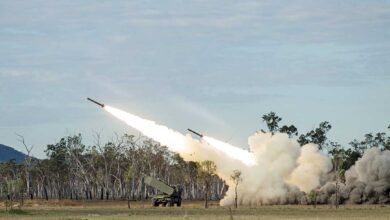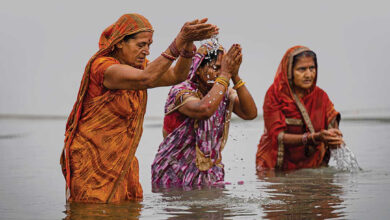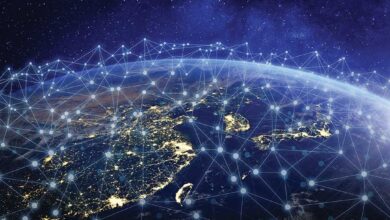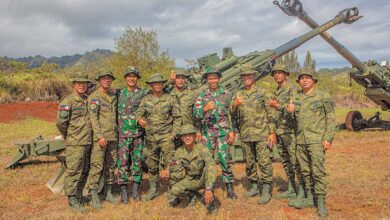Truths Unknown

Inability to verify North Korean claims prompts questions about the status of its people, missiles, leadership
FORUM Staff
Transparency in international relations is critical to building trust and avoiding conflict. However, North Korea’s regime has remained anything but forthright when it comes to disclosing confirmable information about the welfare of its people, efforts to denuclearize or the lack thereof, and the health — and often location — of its leader.
The inability of the international community to verify North Korea’s claims of zero COVID-19 cases and the increase in frequency and duration of dictator Kim Jong Un’s disappearances from the public in 2020 and 2021 add to speculation over the regime’s instability.
“Still, it never pays to sell the regime short. It has outlived countless previous reports of its imminent demise,” Bruce Klingner, senior research fellow for Northeast Asia at The Heritage Foundation, wrote for the think tank’s website in July 2021.
Indeed, even as Kim reemerged in June 2021 looking thinner after a four-week hiatus and prompting more conjecture about his health, the regime would resume its provocations three months later by testing a series of missile systems just days apart, in violation of several United Nations Security Council resolutions. If there were any question about the future of the Kim dynasty should rumors of the current ruler’s failing health be true, then Kim’s younger sister, Kim Yo Jong, has been positioned as a possible answer.

“Since representing Kim [Jong Un] at the 2018 Winter Olympics in Pyeongchang, South Korea, Kim Yo Jong has not only acquired prestigious titles within the ruling Workers’ Party. . . she enjoys the absolute confidence of her brother, a leader capable of ordering the execution of his own uncle for alleged treason,” according to The Guardian newspaper.
Kim Yo Jong remains at her brother’s side during key events. Rising to prominence in recent years, she attended each of the three face-to-face meetings between Kim Jong Un and then-United States President Donald Trump, according to The Wall Street Journal newspaper. The Journal credits Kim Yo Jong with leading North Korea’s propaganda and agitation department and signing off on a North Korean statement criticizing the U.S. in 2020 for its insistence that the country denuclearize and a statement rebuking South Korea for criticizing a military exercise by the North.
She again gained media attention in September 2021 by warning of “complete destruction” of bilateral ties with South Korea if then-South Korean President Moon Jae-in continued to describe the North’s weapons demonstrations as provocation, The Associated Press (AP) reported.
“If the president joins in the slander and detraction (against us), this will be followed by counter actions, and the North-South relations will be pushed toward a complete destruction,” her statement said, according to AP. “We do not want that.”
Three Kim men have ruled North Korea since 1948, starting with Kim Il Sung, followed by his son, Kim Jong Il, and then his grandson, Kim Jong Un. Kim Yo Jong’s status may be rising, but experts say there’s no concrete evidence that she would ever become the next regime leader. In fact, most analysts say don’t count down the days of Kim Jong Un’s rule just yet. Some opine that his more-slender frame could be an attempt to improve his health and longevity rather than signs of sickness, according to AP.

STILL AT WAR
North and South Korea technically remain at war because the 1950-53 Korean War ended in an armistice and not a peace treaty. Attempts at reunification have failed, but in September 2021, Moon again called for an official end to the war.
“Today, I once again urge the community of nations to mobilize its strengths for the end-of-war declaration on the Korean Peninsula and propose that three parties of the two Koreas and the U.S., or four parties of the two Koreas, the U.S. and China, come together and declare that the war on the Korean Peninsula is over,” Moon told the U.N. General Assembly.
The most ardent dream of the global community, he said, “is creating a life that is peaceful and secure.” Such a dream remains unrealized on the peninsula, despite efforts by the U.N. and others, he said. South Korea, however, remains committed to ensuring lasting peace takes “firm root” on the peninsula, he said.
“Envisioning a denuclearized, co-prosperous Korean Peninsula, the government of the Republic of Korea [South Korea] has steadily carried forward the Korean Peninsula peace process, and amid the support of the international community, achieved historic milestones,” Moon said. “Peace on the Korean Peninsula begins always with dialogue and cooperation. I call for speedy resumption of dialogue between the two Koreas and between the United States and North Korea.”
Kim Yo Jong responded by calling on the South to abandon “hostile policies” and “double-dealing standards” if it wants to take steps toward reconciliation, according to AP. She did not elaborate, but experts suspect North Korea wants South Korea to help it win relief from sanctions and receive other concessions that might include international recognition as a nuclear weapons state, according to AP.
“I think that only when impartiality and the attitude of respecting each other are maintained, can there be smooth understanding between the North and the South,” Kim Yo Jong said, according to CNN. “I felt that the atmosphere of the South Korean public desire to recover the inter-Korean relations from a deadlock and achieve peaceful stability as soon as possible is irresistibly strong. We, too, have the same desire.”
Lee Sung-yoon, a North Korea expert at The Fletcher School at Tufts University, cautioned that Kim Yo Jong might merely be dangling everything “Moon desperately desires before his term expires” in May 2022, according to The New York Times newspaper. Kim Yo Jong “shows once again how adept she is in the art of psychological manipulation,” Lee told the Times.

Kim Yo Jong called her statement “just my opinion,” according to the Times. Nevertheless, South Korea acknowledged it as meaningful. Still, actions speak louder than words, and South Korea’s Unification Ministry noted the inconsistency in North Korea’s willingness to communicate. The regime had stopped taking South Korea’s calls on a hotline to manage bilateral military relations in August 2021 before restoring communication again two months later.
“It is more important than anything else to have communication in a smooth and stable manner so as to realize denuclearization, the establishment of lasting peace on the Korean Peninsula, and the advancement of relations between the South and the North through dialogue and cooperation,” Lee Jong-joo, the ministry’s spokeswoman, told reporters in late September 2021.
CHANGES APPARENT
Kim Jong Un’s weight loss isn’t the only change providing analyst talking points. Spectators expected a grand show during a North Korean military parade in September 2021. Instead, a toned-down event took place, reflecting what experts see as a harsh reality of a broken North Korea. The country has struggled, they said, due to prolonged border closures because of the pandemic, food shortages from flooding, sanctions and a mismanaged economy. Kim also did not deliver an address.
“North Korean society is under tremendous stress because of decisions made by the Kim regime. So, the parade is intended to show strength and serve as a quarantine morale booster,” Leif-Eric Easley, a professor of international studies at Ewha Womans University in Seoul, told the Times before warning, “We shouldn’t over-interpret foreign policy or negotiating signals from a parade that’s primarily aimed at domestic political audiences.”

Odusan observatory near the Demilitarized Zone separating the two Koreas. AFP/GETTY Images
Seen largely as an attempt to generate national unity, the September parade took place amid North Korea’s worst food crisis in a decade, according to a U.N. Food and Agriculture Organization report. More astonishing, however, was Kim’s public acknowledgment of the crisis in June 2021, when he said resolving the food shortage was “a top priority.”
“In particular, the people’s food situation is now getting tense as the agriculture sector failed to fulfill its grain production” after flood damage, he said, according to the Times. “It is essential for the whole party and state to concentrate on farming.”
As North Korea prolonged border closures — even with China — because of the pandemic, essential items such as medicines have become harder to obtain, the Times reported. More homeless children are scouring trash bins for food in parts of the country, and families are selling furniture to buy food, the Times reported.
“When he [Kim] took power a decade ago, one of his first promises was to ensure that his long-suffering people would ‘no longer have to tighten their belt.’ But those economic plans suffered a setback when the country’s growing weapons arsenal led to punishing international sanctions,” the newspaper reported.

The North Korean regime rarely confirms anything negative or potentially nefarious happening within its borders. What Kim and his Workers’ Party won’t reveal, satellites will.
For example, satellite imagery in August 2021 revealed that North Korea appeared to have restarted the plutonium-producing reactor at its Yongbyon nuclear research facility, according to the International Atomic Energy Agency (IAEA), which uses imagery and open-source material to monitor North Korea’s activities. Then imagery in September 2021 exposed that renovations were underway at the Yongbyon complex that could allow North Korea to increase its production of weapons-grade nuclear material by as much as 25%, Jeffrey Lewis, a weapons expert and professor at the Middlebury Institute of International Studies, told CNN. “The most recent expansion at Yongbyon probably reflects plans to increase production of nuclear materials for weapons production,” he said.
Lewis noted the construction is consistent with ongoing work to add floorspace at the facility. The new area — approximately 1,000 square meters — could house as many as 1,000 additional centrifuges, making it possible to enrich more uranium annually, he told CNN.
As evidence mounts of North Korea’s continued nuclear ambitions, the U.S. has remained steadfast in attempts to achieve denuclearization diplomatically. “We have been very clear about what we want to see happen,” U.S. State Department spokesman Ned Price said, according to CNN. “We are committed to the principle that dialogue will allow us to pursue our ultimate objective, and that’s quite simply the denuclearization of the Korean Peninsula.”
Using its official name of the Democratic People’s Republic of Korea (DPRK), IAEA Director General Rafael Mariano Grossi described North Korea’s nuclear activities as “cause for serious concern” and “deeply troubling.”
“The continuation of the DPRK’s nuclear program is a clear violation of relevant U.N. Security Council resolutions and is deeply regrettable,” Grossi said in September 2021 during his IAEA General Conference speech. “I call upon the DPRK to comply fully with its obligations under relevant U.N. Security Council resolutions, to cooperate promptly with the agency in the full and effective implementation of its NPT [Non-Proliferation Treaty] Safeguards Agreement and to resolve all outstanding issues, especially those that have arisen during the absence of agency inspectors from the country.”
Analysts also point to the uptick in ballistic missile tests conducted at the start of 2022 by North Korea as a sign of Kim’s continued defiance of international law and stockpiling of materials for weapons of mass destruction (WMD). North Korea conducted seven ballistic missile tests in January 2022, more than in all of 2021, prompting the U.S. to levy a new round of sanctions against individuals and entities accused of helping develop and procure ballistic missile-related materials for Kim.
Kim continued to escalate tensions in early 2022, conducting tests February 27 and March 5 of what U.S. administration officials characterized as “a relatively new intercontinental ballistic missile system,” which triggered additional U.S. sanctions. A 10th test March 16 ended in apparent failure, exploding soon after liftoff, according to South Korean reports, but fueled speculation that larger tests would be forthcoming.
After the February test, the U.S. and 10 other countries condemned the ballistic missile launch as “unlawful and destabilizing” and urged the U.N. Security Council to condemn the North Korean regime for violating multiple council resolutions. U.S. Deputy Ambassador Jeffrey DeLaurentis read the 11 U.N. members’ joint statement surrounded by diplomats from six other council nations — Albania, Brazil, France, Ireland, Norway and the United Kingdom — as well as Australia, Japan, New Zealand and South Korea.“We remain committed to seeking serious and sustained diplomacy and urge Pyongyang to respond positively to outreach from the United States and others,” the statement said. The 11 countries urged North Korea “to choose the path of diplomacy to ease regional tensions and promote international peace and security” and affirmed their readiness for dialogue, stressing that “we will not waver in our pursuit of peace and stability.”
HUMAN RIGHTS
Unyielding international sanctions and a persisting pandemic have exacerbated the daily hardships inflicted by the regime on North Korean citizens. Through it all, labor camps continue to exist. Nongovernmental organizations (NGOs) and others charge that these camps violate human rights. Meanwhile, Kim Jong Un in September 2021 thanked the youth for “volunteering” for mandatory labor to atone for “lagging behind” or “cultural infiltration,” according to Human Rights Watch, an international NGO headquartered in New York City.
“The North Korean government’s use of hard labor justified by ideological demands is common. The demanded labor is used for projects that Kim Jong Un has deemed a priority, such as mining, farming and construction,” according to Human Rights Watch. “This allows North Korea to boost domestic production — even more relevant now that cross-border trade has almost stopped — while sending specific political messages to the people.”
In April 2021, Kim ordered a crackdown on things the regime considers anti-socialist, individualistic or unsavory. Those included words, acts and fashion.
“Young people were directed to stop watching, reading or listening to unsanctioned videos, broadcasts or texts; not mimic the speech, clothes and hairstyles of South Korean television series characters; and re-embrace a life that shows loyalty to the North Korean leadership, carries on the socialist system and follows the government’s propaganda and orders,” Human Rights Watch reported. “These so-called ‘volunteer’ mobilizations of people to work in mines, farms or construction sites involve backbreaking labor under extremely harsh and dangerous conditions for long periods of time with little or no pay. The North Korean government may say these are all volunteer projects, but the reality is very few people can turn down the request. Since punishment for crimes in North Korea is arbitrary, depending on a person’s record of loyalty, personal connections, and capacity to pay bribes, refusal to work as a ‘volunteer’ can result in severe punishment, including torture and long imprisonment.”
The U.N. Human Rights Council monitors North Korean prison camps, seeking to interview survivors who escape and pledging to prosecute Kim Jong Un and other North Korean officials engaged in abuses.
“Analysis of available information continues to confirm that there are reasonable grounds to believe that crimes against humanity have been committed and may be ongoing in the Democratic People’s Republic of Korea,” the U.N.’s Office of the High Commissioner for Human Rights (OHCHR) reported in January 2021. “OHCHR reiterates that there is no statute of limitations for crimes against humanity, and that those responsible for past and ongoing crimes should be held accountable. A lasting peace on the Korean Peninsula can be achieved only if such violations end and the rights of victims to truth, justice, reparations and guarantees of non-recurrence are fulfilled.”
Ahn Myeong Chul knows the atrocities occurring inside the walls of North Korean prison camps all too well. A former Korean People’s Army soldier, Ahn worked as a guard at various prison camps, including the Hoeryong and Onsong concentration camps, from the 1980s to the 1990s. He escaped and fled to South Korea. Now, Ahn is executive director of NK Watch, a Seoul-based NGO devoted to assisting North Korean defectors and bringing Kim Jong Un to trial at the International Criminal Court in The Hague, Netherlands, for crimes against humanity.
“The problem of forced labor or deficient food distribution in North Korea has been happening continuously for 70 years since the birth of the North Korean government. The overall situation of human rights in North Korea is very poor,” Ahn told FORUM. “The biggest reason for this is that the Kim family blocks information about the outside world in order to maintain their system, and North Koreans have been exposed only to the propaganda of idolization of the Kim family since their childhood, so they know nothing about the outside world. As a result, there is an atmosphere among North Korean residents of accepting that they are born to live in such ways.”
Ahn said defectors help bring some change to the closed society, delivering outside news through phone calls and other means. More must be done, he said, imploring the international community to keep human rights atrocities at the forefront of conversations about North Korea as much as discussions on denuclearization.
Many truths, moreover, are known within the country’s borders. “North Korea’s biggest Achilles’ heel is the human rights issue,” Ahn told FORUM. “I can’t express it in words, but North Korean people are being tortured. The international community must continue to send the message to North Korea that crimes against humanity must be punished internationally.”




